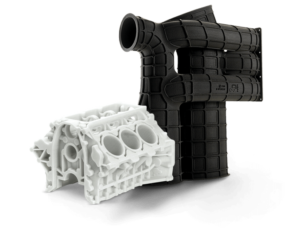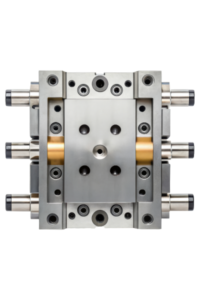When it comes to product performance, a pivotal question emerges: Is the chosen material truly optimal for the intended application? The power of selecting the right material, whether it’s high-performance plastics or metals, cannot be underestimated. It can result in pivotal gains, transforming a race car into a victorious contender by shaving off a few kilos, turning a once-unfeasible coffee brewer into a commercially viable product, or even enhancing the sterilization capacity of an inhaler for swift adoption in hospitals.
In our extensive portfolio of injection molding projects at Quickparts, we’ve come to understand that there are instances where high-performance plastics cannot substitute metal alloys. However, we’ve also witnessed numerous scenarios where polymers surpass metals in terms of performance.
For example, consider Delrin plastic, also known as PolyOxyMethylene (POM). As Dupont’s brand of acetal polymer, Delrin stands out with two distinctive characteristics:
- Uniform Semi-Crystalline Molecular Orientation: This imparts greater stiffness and mechanical strength compared to other acetal plastics.
- Porous Center: During cooling, gas escapes from the plastic’s center. While typically unproblematic for most industrial applications, this porosity can pose a bacterial growth risk in specific food and medical contexts.
Delrin plastic, owing to its durability and robustness, finds applications in CNC Machining, Injection Molding, and 3D Printing. It exhibits hardness, making it a favorable choice for precision-demanding parts. Additionally, Delrin can withstand high temperatures and offers wear resistance, rendering it suitable for additive manufacturing. These attributes are just a glimpse; Delrin is available in various grades, each with its distinct properties.
Understanding Delrin Plastic Properties
Delrin plastic’s attributes span a wide spectrum of characteristics, each playing a role in material selection for your projects.
Delrin Plastic as a Viable Metal Alternative
Delrin plastic presents a compelling case as a go-to solution for your projects. While its advantages are apparent in cases like race cars, in more intricate scenarios, assessing the benefits becomes more intricate. Quickparts can guide you through considering Delrin plastic as an alternative material.
Delrin Plastic vs. Metals: Weighing the Pros and Cons
The cost-benefit ratio between plastics and metals guides the selection process. Starting this evaluation involves:
- Material Substitution: Transitioning from a metal alloy prototype to an engineering-grade polymer with a similar design could yield significant improvements, especially if the initial metal design was suboptimal.
- Redesign with Plastics in Mind: Leveraging plastics’ advantages through redesign, such as reducing parts count and incorporating complex shapes and colors, can lead to cost and time savings.
- Hybrid Approach: Combining polymer components with metal features in critical areas offers unique advantages.
Delrin Plastic’s Upsides and Downsides
Advantages of Delrin plastic encompass high tensile strength with rigidity, excellent impact resistance, and chemical resistance, among others. On the flip side, challenges like difficulty in bonding, susceptibility to UV degradation, and brittleness at low temperatures exist.
Choosing the Right Delrin Material
Delrin plastic comes in different grades denoted by their melt viscosity, with numbers ranging from 100 to 1700. The grade selection hinges on your fill requirements and end-use function. Quickparts offers a selection of popular Delrin grades, aiding your choice.
Delrin Plastic in Rapid Prototyping: Stability and Machinability
In rapid prototyping, where speed is paramount, Delrin plastic’s stability and high machinability shine. Whether in CNC machining, Injection Molding, or 3D Printing, Delrin proves its mettle as a reliable option.
Applications of Delrin in Rapid Prototyping: Versatility Revealed
Delrin plastic’s wide-ranging applications span industries like automotive, industrial, electrical, household appliances, and consumer products. From automotive components to household appliances, Delrin’s versatility shines.
Delrin: A Mighty Contender to Metals
Transitioning from metal to plastic in demanding applications is a viable solution. To explore this shift, collaborate with Quickparts’ experts to ascertain how Delrin plastic, a high-performance material, can meet your functional needs within acceptable manufacturing costs.
At Quickparts, we are dedicated to:
✓ Offering a diverse array of plastic material options ✓ Assisting in the evaluation of these materials based on your application needs ✓ Employing best practices to ensure your product’s successful journey to market
If you’re embarking on a project, submit your details here, and our adept team will provide you with expert guidance.


